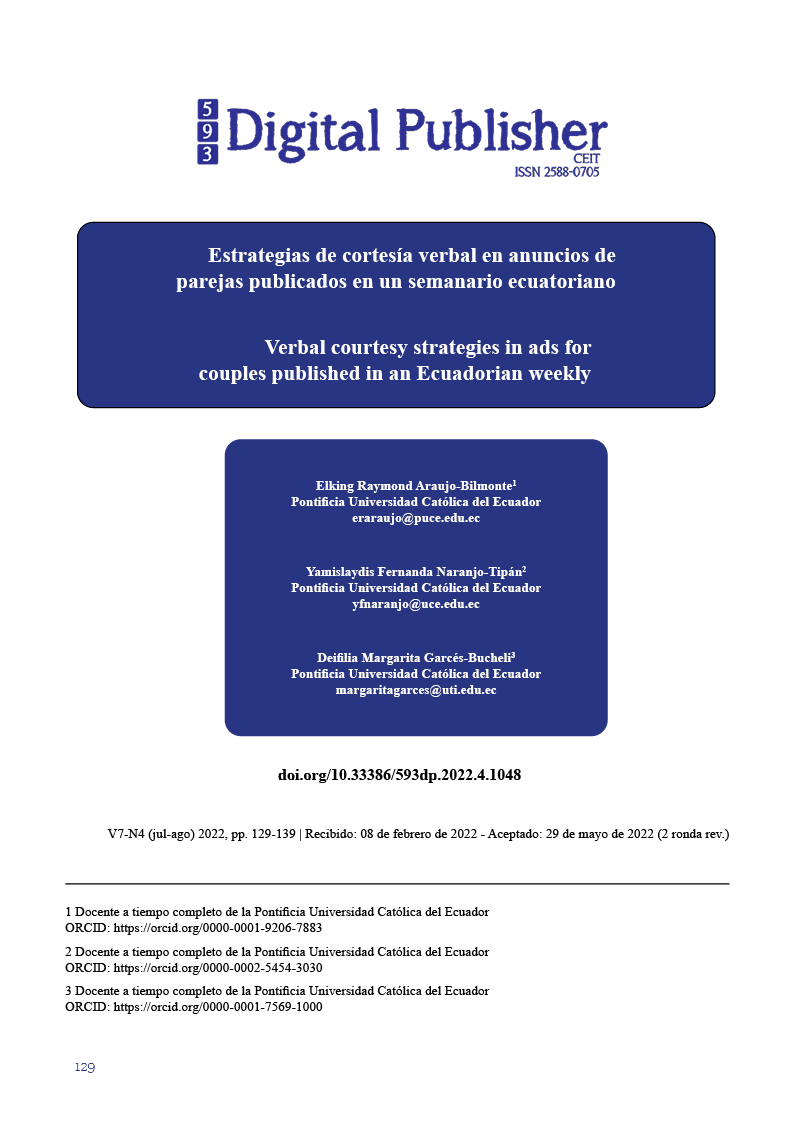Verbal courtesy strategies in ads for couples published in an Ecuadorian weekly
Main Article Content
Abstract
Verbal courtesy comprises a set of linguistic resources used by speakers in their communicative exchanges for different purposes. One of the speaking situations in which verbal courtesy plays a fundamental role is courtship. In this space of interaction, seeking to attract the other to establish an affective bond requires taking care of one's own image, the image of the other and, at the same time, reinforcing the resources of seduction. Couple ads are part of these territories of interaction where verbal courtesy offers a representative catalog of the rules that govern the society to which the interlocutors belong and the resources they know. In order to establish these linguistic strategies in the couple ads, a corpus was built with the ads published in the Sunday weekly “Familia” of the newspaper “El Comercio”, in the section “Lonely Hearts” during the year 2020. The ads were divided into two groups according to the advertisers ' self-identification as men or women. The strategies were labeled and classified following the latest theoretical proposals. The results show that the strategies used are determined by the discursive characteristics of the couple's announcement, that the set of typologies used is less than that proposed by the theory and that, within the strategies, a preferential use is seen due to the typology of impersonalization, self-referencing in the third person, the use of vocatives and the use of the conditional as an attenuator in managerial acts.
Downloads
Article Details

This work is licensed under a Creative Commons Attribution-NonCommercial-ShareAlike 4.0 International License.
1. Derechos de autor
Las obras que se publican en 593 Digital Publisher CEIT están sujetas a los siguientes términos:
1.1. 593 Digital Publisher CEIT, conserva los derechos patrimoniales (copyright) de las obras publicadas, favorece y permite la reutilización de las mismas bajo la licencia Licencia Creative Commons 4.0 de Reconocimiento-NoComercial-CompartirIgual 4.0, por lo cual se pueden copiar, usar, difundir, transmitir y exponer públicamente, siempre que:
1.1.a. Se cite la autoría y fuente original de su publicación (revista, editorial, URL).
1.1.b. No se usen para fines comerciales u onerosos.
1.1.c. Se mencione la existencia y especificaciones de esta licencia de uso.
References
Brown, P., & Levinson, S. (1978). Politness. Some universals in language usage. Cambridge University Press.
Carrasco Santana, A. (1999). Revisión y evaluación del modelo de cortesía de Brown y Levinson. Pragmalingüística, 1-44.
Carriburo, N. (1997). Las fórmulas de tratamiento en el español actual. Arco Libros.
Dorta, J., & González, M. J. (2017). Cortesía y prosodia en el español conversacional de San Antonio de Texas. Calidoscópio, 317-332.
Haverkate, H. (1994). La cortesía verbal. Gredos.
Isosävi, J. (2020). Cultural outsiders’ evaluations of (im)politeness in Finland and in France. Journal of Politeness Research, 249–280.
Jimeno Patrón, J. (2012). El correo electrónico de petición en el ámbito académico estudio contrastivo alemán/español. Memoria de Máster, Universidad Antonio de Nebrija.
Lakoff, R. (1972). Language in context. Language, 907-927.
Lakoff, R. (1973). The logic of politness, or Minding your P’s and Q’s. Proceedings of the Ninth Regional Meeting of the Chicago Linguistic Society , 345-356.
Nicholls, C. (2009). El conocimiento de normas pragmáticas en las peticiones electrónicas. Un estudio comparativo entre hablantes del español como lengua nativa, lengua heredada y lengua extranjera. Tesis de la Universidad de Arizona.
Nord, C. (2019). La cortesía literaria en español e italiano: los tratamientos en la traducción de las novelas de Caslos Ruiz Zafón. inTRAlinea, 1-6.
Percival, p., & Pulford, B. (2019). Do say “thank you”: Verbal expressions of politeness and gratitude influenceinterpersonal perceptions. The Journal of GeneralPsychology, 228-243.
Robles Garrote, P. (2014). La cortesía verbal en la interacción asincrónica académica: análisis contrastivo en inglés, español e italiano. Estudios de lingüística aplicada, 117-139.
Ruytenbeek, N. (2020). Do indirect requests communicate politeness? An experimental study of conventionalized indirect requests in French email communication. Journal of Politeness , 1-32.
Taboada, M. (2012). Los géneros: una perspectiva sistémico-funcional. En M. Shiro, P. Charaudeau, & L. Granato, Los géneros discursivos desde múltiples perspectivas: teorías y análisis (págs. 46-67). Iberoamericana.
Villalpando Acuña, A. (2012). Modelando el cortejo humano: negociación e intercambio en las relaciones de pareja desde la perspectiva de la sociología económica. Sociológica, 53-87.




